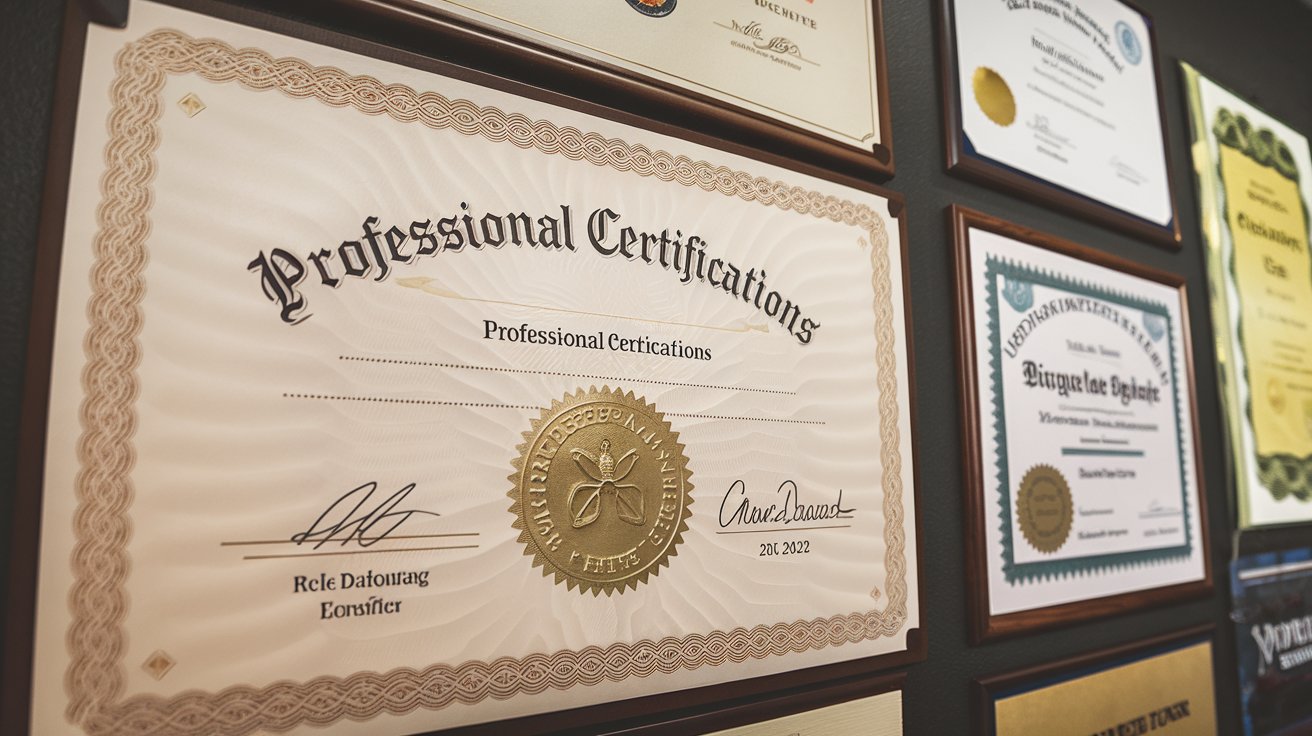In today’s competitive job market, standing out is essential for career advancement and personal growth. One effective way to enhance your qualifications and increase your employability is through professional certifications. These credentials not only demonstrate your expertise but also signal your commitment to your field. This article explores the significance of professional certifications, the types available, and how to choose the right one for your career goals.
Table of Contents
ToggleWhy Professional Certifications Matter
- Validation of Skills and Knowledge Professional certifications serve as a formal recognition of your skills and knowledge in a specific area. They provide employers with tangible proof of your qualifications, helping you gain a competitive edge in the job market.
- Increased Earning Potential Many studies indicate that certified professionals often earn higher salaries compared to their non-certified peers. Certifications can open doors to advanced positions and greater financial rewards, making them a worthwhile investment.
- Career Advancement Opportunities Earning a professional certification can enhance your resume and position you for promotions or leadership roles. Many employers prefer or require certifications for certain positions, especially in fields like IT, healthcare, and finance.
- Networking Opportunities Pursuing certifications often involves joining professional organizations and attending industry events. This provides valuable networking opportunities, allowing you to connect with peers, mentors, and industry leaders.
- Commitment to Professional Development Obtaining a certification demonstrates your dedication to your profession and continuous learning. This commitment can enhance your reputation within your industry and signal to employers that you are proactive about your career.
-

Professional Certifications
Types of Professional Certifications
- Industry-Specific Certifications Many fields have specialized certifications that are recognized and respected within the industry. Examples include Project Management Professional (PMP) for project managers, Certified Public Accountant (CPA) for accountants, and Cisco Certified Network Associate (CCNA) for IT professionals.
- General Business Certifications Certifications such as Six Sigma, Lean Management, and Certified Business Analysis Professional (CBAP) provide valuable skills applicable across various industries. These certifications focus on improving processes, efficiency, and decision-making.
- Technical Certifications In the technology sector, certifications like CompTIA A+, Microsoft Certified: Azure Fundamentals, and Certified Information Systems Security Professional (CISSP) validate technical skills in areas such as IT support, cloud computing, and cybersecurity.
- Healthcare Certifications The healthcare industry offers a range of certifications for various roles, including Certified Nursing Assistant (CNA), Certified Medical Assistant (CMA), and Board Certified Behavior Analyst (BCBA). These certifications help professionals demonstrate their expertise in patient care and specialized fields.
- Trade Certifications Skilled trades such as plumbing, electrical work, and carpentry often require specific certifications or licenses. These credentials ensure that professionals meet industry standards and regulations.
-

Professional Certifications
How to Choose the Right Certification
- Assess Your Career Goals Consider your long-term career objectives and how a certification aligns with those goals. Research the certifications that are highly regarded in your industry and may help you achieve your aspirations.
- Evaluate the Requirements Each certification has its own prerequisites, including education, experience, and exams. Make sure you meet these requirements or are willing to complete them before pursuing a specific certification.
- Research the Value Look into the certification’s recognition within your industry. Seek feedback from professionals who hold the certification and assess its impact on their careers. This can provide valuable insights into its value and relevance.
- Consider Your Learning Style Different certifications offer various study formats, including online courses, workshops, and in-person training. Choose a learning method that suits your style and schedule to ensure you can successfully prepare for the certification exam.
- Budget for Costs Certification programs can vary significantly in cost. Consider the total expenses, including exam fees, study materials, and any required training. Ensure the investment aligns with your budget and anticipated return on investment.
Conclusion
Professional certifications are powerful tools for career advancement and skill validation. By demonstrating expertise and commitment, they can enhance your employability, increase earning potential, and open doors to new opportunities. Whether you’re looking to climb the corporate ladder, shift careers, or deepen your knowledge in your field, pursuing the right certification can be a significant step in your professional journey. As industries continue to evolve, staying ahead through continuous learning and certification can set you apart in a competitive job market.